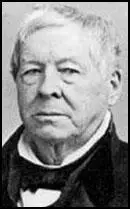Thomas Garrett

Thomas Garrett, the son of a farmer, was born on 21st August, 1789, in Delaware County. He became involved in the iron trade and after marrying settled in Wilmington, Delaware. A Quaker, who was strongly opposed to slavery and joined the Pennsylvania Abolition Society.
Delaware was a slave state and adjacent to Pennsylvania and New Jersey on one side and Maryland on the other, was a particular target for runaway slaves. Garrett turned his home in Wilmington into the last station on the Underground Railroad before the slaves reached freedom in Pennsylvania. It has been estimated that Garrett helped more than 2,000 runaway slaves escape from the Southern states. The Maryland authorities were so angry with Garrett that they set a reward of $10,000 for his arrest.
In 1848 Garrett was brought before a Federal court. Garrett admitted he had aided fugitive slaves and would continue to do so. This resulted in a heavy fine that forced him into bankruptcy. However, with the help of his anti-slavery friends, Garrett was able to re-establish his business.
During the Civil War Garrett was vulnerable to pro-slavery elements in Delaware and his home had to be protected by African American volunteers.
After the passing of the 15th Amendment which gave the vote to African Americans, Garrett was drawn through the streets of Wilmington by former slaves in an open carriage inscribed with the words "Our Moses".
Thomas Garrett died on 25th January, 1871. He left instructions that he was to be carried to his grave by African Americans and that they should participate in the Quaker service.
Slavery in the United States (£1.29)
Primary Sources
(1) Thomas Garrett, wrote a letter to Sarah Bradford about the activities of Harriet Tubman on the Underground Railroad (June, 1866)
The date of the commencement of her labors, I cannot certainly give; but I think it must have been about 1845; from that time till 1860, I think she must have brought from the neighborhood where she had been held as a slave. from 60 to 80 persons, from Maryland, some 80 miles from here.
No slave who placed himself under her care, was ever arrested that I have heard of; she mostly had her regular stopping places on her route; but in one instance, when she had several stout men with her, some 30 miles below here, she said that God told her to stop, which she did; and then asked him what she must do. He told her to leave the road, and turn to the left; she obeyed, and soon came to a small stream of tide water; there was no boat, no bridge; she again inquired of her Guide what she was to do. She was told to go through. It was cold, in the month of March; but having confidence in her Guide, she went in; the water came up to her armpits; the men refused to follow till they saw her safe on the opposite shore. They then followed, and, if I mistake not, she had soon to wade a second stream; soon after which she came to a cabin of colored people, who took them all in, put them to bed, and dried their clothes, ready to proceed next night on their journey. Harriet had run out of money, and gave them some of her underclothing to pay for their kindness.
When she called on me two days after, she was so hoarse she could hardly speak, and was also suffering with violent toothache. The strange part of the story we found to be, that the masters of these men had put up the previous day, at the railroad station near where she left, an advertisement for them, offering a large reward for their apprehension; but they made a safe exit. She at one time brought as many as seven or eight, several of whom were women and children. She was well known here in Chester County and Philadelphia, and respected by all true abolitionists.

